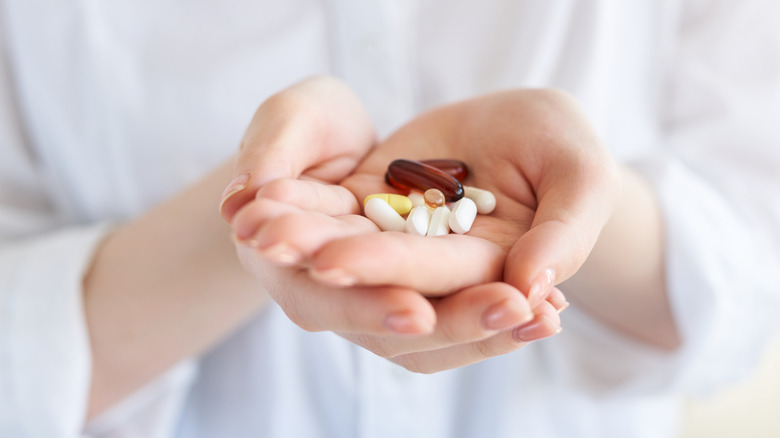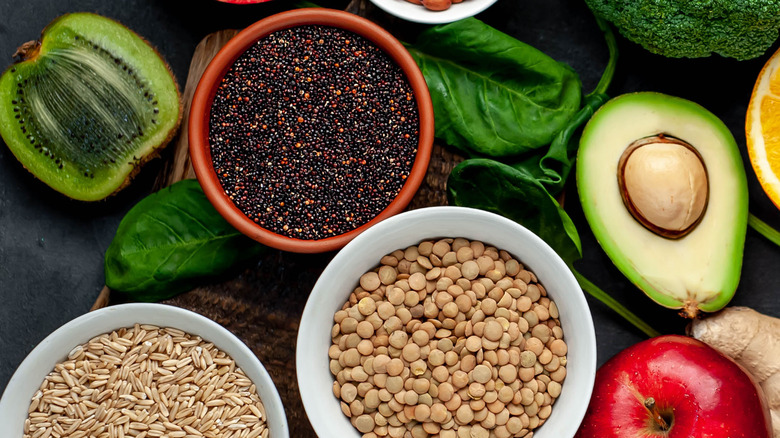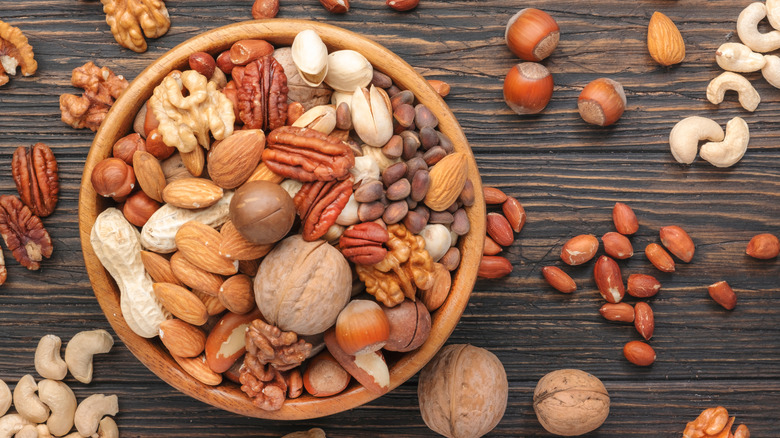Vitamins And Supplements You Should Take When Following A Vegan Diet
Because a vegan diet does not include food from any animal sources, it can lack certain nutrients. For this reason, vegans need to be mindful of what vitamins and supplements their diet could be lacking. Many vegans are at a higher risk for developing a deficiency in vitamin B12 because it comes mainly from animal sources, per BBC News. WebMD reports that this vitamin is important because it helps red blood cell development. In addition, a deficiency can lead to nerve damage (via BBC News). Adults need 2.4 micrograms of vitamin B12 per day, and the best way vegans can add it to their diet is to take a supplement or eat food fortified with it, according to Forks Over Knives.
Vitamin D is another vitamin vegans need to make sure they're getting enough of. Like vitamin B12, most of the sources of vitamin D are found in animals (via WebMD). The best way for vegans to add it to their diet is with fortified foods like cereals and plant-based milk and juices, per Greatist. Of course, you can get vitamin D from the sun, but the Cleveland Clinic reports that about half of the population has a deficiency in it, so supplementing is not just for vegans. Your body needs vitamin D to build strong bones and maintain the balance of calcium in the blood, and adults need about 600 international units of it daily, per WebMD.
Important minerals vegans need
Along with vitamin B12 deficiencies, iron is another nutrient that is difficult to get enough of on a plant-based diet. This is especially true for menstruating women. There are two types of iron: heme and non-heme. Heme iron, which is better absorbed by the body, is found mostly in meats. Non-heme iron is found in leafy greens, nuts, and legumes, per Harvard School of Public Health. Plant sources, which include quinoa, avocado, and nuts, won't give you the same amount of iron you would get from animal sources, so an iron supplement is generally necessary, explains Stanford Medicine. Adults need about 900 micrograms per day, according to WebMD.
Calcium is another mineral vegans need to monitor. Calcium is essential for strong bones, blood clotting, and muscle function. Adults need between 1,000 and 1,200 milligrams per day. Greens, beans, lentils, chickpeas, chia seeds, almonds, tofu, dried figs, and dates contain calcium, but according to BBC Good Food, the absorption rate of plant-based calcium is lower than that of animal sources. For this reason, it's important to make sure you're getting enough.
Other nutrients vegans should consider
Omega-3 fatty acids are essential for brain, heart, kidney, eye, and skin health, per the Physicians Committee for Responsible Medicine (PCRM). Most people think of fish and fish oil supplements as good sources of these kinds of fats, but there are plenty of plant-based sources as well. Plant-based sources of omega-3s include flaxseed, chia seeds, walnuts, beans, and edamame. The National Institute of Health (NIH) explains that men need 1.6 grams and women need 1.1 grams of the omega-3 fatty acid ALA daily.
Zinc is another nutrient vegans should make sure is in their diet. This is because plant sources that contain zinc also contain other compounds that inhibit the absorption of the mineral, according to the Medical Journal of Australia. Zinc promotes a healthy immune system. Rolled oats, nuts, seeds, legumes, soy, and tofu are good sources of zinc. WebMD reports that men need 11 milligrams per day while women need around 8.



